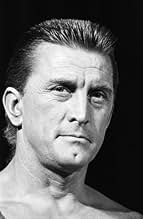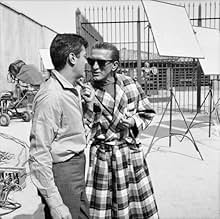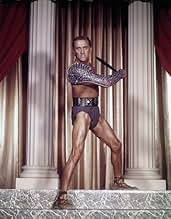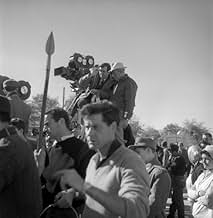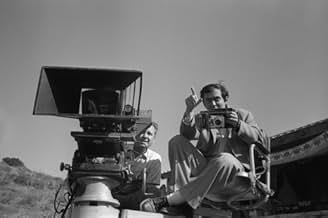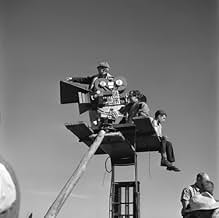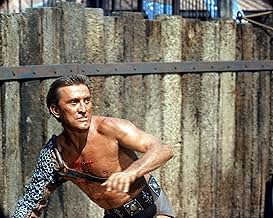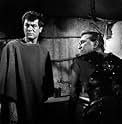Spartacus
- 1960
- Tous publics
- 3h 17m
The slave Spartacus survives brutal training as a gladiator and leads a violent revolt against the decadent Roman Republic, as the ambitious Crassus seeks to gain power by crushing the upris... Read allThe slave Spartacus survives brutal training as a gladiator and leads a violent revolt against the decadent Roman Republic, as the ambitious Crassus seeks to gain power by crushing the uprising.The slave Spartacus survives brutal training as a gladiator and leads a violent revolt against the decadent Roman Republic, as the ambitious Crassus seeks to gain power by crushing the uprising.
- Won 4 Oscars
- 12 wins & 11 nominations total
Summary
Featured reviews
It would be well-nigh impossible now to assemble a cast of such substance and quality. There were bound to be clashes of temperament of course and the animosity between Olivier and Laughton has been amusingly recounted by Peter Ustinov who picked up an Oscar as Best Supporting actor. Olivier here is in his physical prime and is magnificent in the role of Crassus. He is ruthlessness incarnate but tender in his scenes with the Lavinia of Jean Simmons. He had previously directed her in 'Hamlet' and their professional bond is palpable.
There are scenes which are indelibly etched notably the gladiatorial combat between Douglas and Woody Strode and the scene where the slave army watches the legions of Crassus forming for battle which must surely have been inspired by Eisenstein's 'Alexander Nevsky'. The score by Alex North although harsh captures perfectly the brutality of the times whilst Russell Metty's cinematography is outstanding.
Forget the others, this is the only gladiator film that really matters and it will never be surpassed.
But you will notice that Bryna Productions not only financed SPARTACUS but also an earlier film directed by Kubrick, PATHS OF GLORY (1958). Bryna was Kirk Douglas' film company and, as most filmgoers know, he was the star of both films. Besides having all the money to make the films, Douglas had artistic vision as well. Only three weeks into what would prove to be an incredibly complex and arduous production, Douglas fired venerable director Anthony Mann (RAW DEAL, RAILROADED,THE FURIES, THE NAKED SPUR, THE MAN FROM LARAMIE, MAN OF THE WEST, etc.) from SPARTACUS. With only two days notice, Kubrick was hired to replace him.
Shooting PATHS OF GLORY, Douglas had confined his criticisms and objections to Kubrick's failed rewriting of the script (they went with the original screenplay). Douglas' complaints and artistic influence were far greater on SPARTACUS, much to Kubrick's chagrin. Though the director craved autonomy over every aspect of the film, Douglas would not budge. A tense compromise was reached but ultimately Douglas had the last word. Kubrick saw himself as just a hired gun. And he would never allow himself to be placed in this position again.
Later, both men would complain about the film's outcome and each other. They never made another movie together.
But SPARTACUS is no uneven patchwork of divergent ideas. The film is cohesive and arresting. At the restored version of three hours and eighteen minutes, there is practically no dead footage in the film. Dalton Trumbo's screenplay is surprisingly economical, with sharply drawn characters placed against the sweeping historical majesty and violent sociological tumult of ancient Rome. Quite plainly, the gloriously inventive music by Alex North is among the greatest scores ever written for a motion picture. And despite Kubrick's bad experience, he managed to guide the actors towards creating outstanding work (a best supporting actor Oscar for Peter Ustinov). He even transformed the very real enmity between Laughton and Olivier into an on-screen asset. His other contributions were considerable also (the large scale and power of the battle sequence, for example). In the end, for the film at least, the clash of giant egos proved fortuitous. Recommendations: for greater insight and detail on this and Kubrick's other films I urge you to seek out Jan Harlan's excellent documentary, STANLEY KUBRICK: A LIFE IN PICTURES, and Vincent LoBrutto's exhaustive, highly informative biography, STANLEY KUBRICK. For the producer's views on SPARTACUS and its director, take a gander at Kirk Douglas' very candid autobiography, THE RAGMAN'S SON.
But the result was all worth it. The stars all give top notch performances, but the mark of a really great film is the memorability of each individual in the ensemble. To give a few examples, Charles McGraw as the sadistic trainer at the gladiatorial school, John Dall as Sir Laurence Olivier's protégé, and John Ireland as Kirk Douglas's fellow gladiator trainee are all memorable in the brief roles they have.
Kirk Douglas wisely opts for a straightforward interpretation of a hero in the title role of Spartacus. He's a BC everyman, born into a world which hadn't heard anything about human rights, he knows and feels he's not just cattle. Catch the alternating scenes of Douglas and Sir Laurence Olivier addressing the slave army and the Roman Army. Olivier with his years of Shakespearean training coming across as the tyrant to be, and Douglas in simple prose talking about the slaves fighting for their hopes and dreams. Very effective.
The plot concerns a revolt at a gladiatorial school which mushrooms into a crisis for the Roman Empire. Political factions led by Olivier as Crassus and Charles Laughton as Gracchus seek to use the slave revolt to further their own ends.
Laughton as always is a wonder. It's a bit of unusual casting for him because his parts are usually those of very tortured souls. His Gracchus is a sly rogue, but a decent man. One of my favorite movie lines of all time is delivered by him addressing the Roman Senate where he says he'll "take a little republican corruption for a little republican freedom."
Another sly rogue in the film is Peter Ustinov who won the first of his two Oscars as Batiatus the owner of the gladiatorial school. Like so many others I'm sure in those days, he's just trying to come out on the winning side when doing so could be a life or death situation.
Jean Simmons as Varinia, beloved of Spartacus, has the only woman's part of any substance. But when was Ms. Simmons bad in anything. One of the most underrated and under-appreciated actresses in the history of film.
The lessons about man's desire for freedom and to control his own destiny are eternal and valid. And this film will be also.
Did you know
- TriviaStanley Kubrick was brought in as director after Kirk Douglas had a major falling out with the original director, Anthony Mann. According to Sir Peter Ustinov, the salt mines sequence was the only footage shot by Mann.
- GoofsAntoninus is wearing trousers under his tunic when Tigranes enters the tent saying he arrived on horseback without any slaves. When Spartacus opens the treasure-chest Antoninus is suddenly bare-legged.
- Quotes
Herald: I bring a message from your master, Marcus Licinius Crassus, Commander of Italy. By command of His Most Merciful Excellency, your lives are to be spared. Slaves you were and slaves you remain. But the terrible penalty of crucifixion has been set aside on the single condition that you identify the body or the living person of the slave called Spartacus.
Antoninus: [stands up] I'm Spartacus!
[everyone around Antoninus and Spartacus stands up and shouts "I'm Spartacus!"]
- Crazy creditsThe six main cast members are accompanied by an item that represents their character (a chain, a Roman eagle, a wine jug, a couple of hands - one wielding a snake, and a sword).
- Alternate versionsAfter its premiere the film was heavily cut and wasn't shown in its complete form until 1991, when a restored version was re-released. Among the restored scenes is one where where Marcus Crassus (Laurence Olivier) tries to seduce Antonius (Tony Curtis) in the bath. The soundtrack was damaged, so Anthony Hopkins was called in to dub Olivier's lines. In addition, several scenes of violence preview audiences reacted to negatively were restored, including Crassus bloodily stabbing Draba, Marcellus being drowned in the stew, Spartacus stabbing a Roman soldier in the pool, and several gory shots in the final battle, notably Spartacus lopping off the arm of a Roman soldier.
- ConnectionsEdited into Hercule: Les Contemptibles (1997)
Details
- Release date
- Country of origin
- Official site
- Language
- Also known as
- Espartaco
- Filming locations
- Hearst Castle, San Simeon, California, USA(Crassus' villa)
- Production company
- See more company credits at IMDbPro
Box office
- Budget
- $12,000,000 (estimated)
- Gross US & Canada
- $1,830,650
- Opening weekend US & Canada
- $92,162
- Apr 28, 1991
- Gross worldwide
- $1,855,491
- Runtime3 hours 17 minutes
- Color
Contribute to this page





